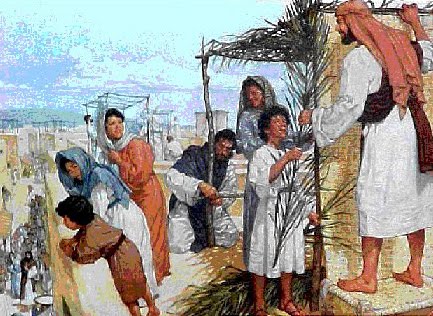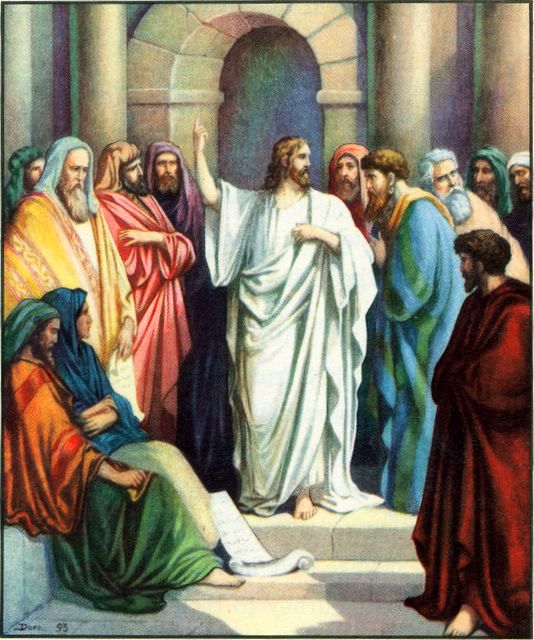
The Feast Of Tabernacles
THE Feast of Tabernacles, which Jesus was now going to attend, was one of the three great feasts of the year. At each of these feasts a great multitude assembled at Jerusalem; for the law required every man in the nation to attend them, and thousands of women and children went with their fathers, husbands, and brothers to these great festal gatherings.
The Feast of Tabernacles was a feast of rejoicing. It was held just after the gathering in of the harvest.
The whole nation came together to spend a week in praising God for the bounties of the year. God gave his promise that while the whole land was thus left almost deserted, no enemy should invade, it. This feast was called the Feast of Tabernacles, because,
while holding it, the people dwelt in booths. These leafy tabernacles were made of bushes, and the branches of green trees. They were meant to remind the people of the wanderings of their forefathers in the wilderness, where for forty years they had to encamp in the open air, with no shelter but booths, or tents of some kind; for they were continually moving from place to place, and could not build permanent houses. During this feast there was also a ceremony, which was meant to remind the people of God's goodness in bringing water from the rock in the wilderness.
All through this feast Jerusalem presented a beautiful sight. In the daytime nothing was to be seen but a forest of green booths, adorning the flat housetops, covering the sloping hillsides, and scattered along the winding valleys. At night, the whole city was lit up by the light, from the temple and its courts.
At break of day the priests blew their silver trumpets; and when the people heard the sound echoing among the hills, and through the valleys, they all joined in a glad shout of praise. Many animals were sacrificed; and all through the week ceremonies were performed to impress upon the people a sense of the majesty and goodness of God, and of his care over them as a people. Suitable passages of Scripture were read and repeated, and frequently the air was made to ring with the music of voices and instruments, sounding forth the praises of the God of heaven.
It was such a feast as this, that our Lord was going to attend.
We have already seen that he did not go up at the beginning of the feast; but after the great crowd of people had gone up, he followed on quietly with his disciples, teaching them many useful lessons by the way, and sending out seventy of their number to prepare the people for his preaching. It seems that the people at the feast were expecting to see him there, and wondered why he did not come. There was much talk about him, some saying that he was a good man, and others claiming that he deceived the people.
About the middle of the feast, Jesus went up into the temple, and began to teach with such effect that even his enemies wondered at the power and wisdom of his words. He told the people plainly that he was sent from heaven; that his doctrine was from above; that he was the Son of God; and that he spoke just what his Father had given him to speak. He said, "I am the light of the world. He that followeth me shall not walk in darkness, but shall have the light of life." Thousands of honest people were delighted with his words of instruction and comfort. To them that believed on him, he said, "If ye continue in my word, then are ye my disciples indeed; and ye shall know the truth, and the truth shall make you free." But many of the Jews, especially the chief priests, and the doctors of the law, were jealous because Jesus had so much influence with the people. They were also angry because he exposed their wickedness. They wanted to kill him, and sent officers to take him; but when the officers came into his presence, they were powerless, and returned, saying, "Never man spake like this man."
To these wicked leaders of the people, Jesus said,
"Ye are of your father, the devil, and the lusts of your father ye will do; he was a murderer from the beginning, and abode not in the truth, because there is no truth in him. When he speaketh a lie, he speaketh of his own; for he is a liar, and the father of it. .
. . . He that is of God heareth God's words; ye therefore hear them not, because ye are not of God."

JESUS AT THE FEAST.
AT the commencement of the Feast of Tabernacles, the absence of Jesus was commented upon. The Pharisees and rulers anxiously looked for him to come, hoping that they might have an opportunity to condemn him on account of something he might say or do. They anxiously inquired,
Where is he?" but no one knew. Presently a dispute rose among the people in regard to Jesus, many nobly defending him as one sent of God, while others bitterly accused him as a deceiver of the people.
Meanwhile Jesus had quietly arrived at Jerusalem. He had chosen an unfrequented route by which to go, in order to avoid the travelers who were making their way to the city from all quarters. In the midst of the feast, when the dispute concerning Himself was at its height, Jesus walked calmly into the court of the temple, and stood before the crowd as one possessed of unquestionable authority. The sudden and unexpected appearance of one whom they believed would not dare to show himself among them in the presence of all the chief priests and rulers, astonished the people, so that a sudden hush succeeded the excited discussion in which they had been engaged. They were astonished at his dignified and courageous bearing in the midst of so many powerful men who were thirsting for his life.
Standing thus, with the eyes of all the people riveted upon him, he addressed them as no man had ever done. His knowledge was greater than that of the learned priests and elders, and he assumed an authority, which they had never ventured to take. Those very men who had so lately been wrought up to a frenzy of hate, and were ready to do violence to Christ at the first opportunity, now listened spellbound to his words, and felt themselves powerless to do him harm. He was the attraction of the hour; all other interests were forgotten for the time. The hearts of the people thrilled with awe as they listened to his words. .....
And now the feast was drawing to a close. The morning of the last, crowning day found the people wearied from the long season of festivity. Suddenly Jesus lifted up his voice in tones that rang through the courts of the temple: "If any man thirst, let him come unto me, and drink. He that believeth on me, as the Scripture hath said, out of his belly shall flow rivers of living water." The condition of the people made this appeal very forcible. They had been engaged in a continued scene of pomp and festivity, their eyes had been dazzled with light and color, and their ears regaled with the richest music; but there had been nothing to meet the wants of the spirit, nothing to satisfy the thirst of the soul for that which perishes not. Jesus invited them to come and drink of the fountain of life, of that which should be in them a well of water springing up into everlasting life.
The priest had that morning performed the imposing ceremony, which represented the smiting of the rock in the wilderness, and the issuing there from of the water.
That rock was a figure of Christ. His words were the water of life. As Jesus
spoke thus to the people, their hearts thrilled with a strange awe, and many were ready to exclaim, with the woman of Samaria, "Give me of this water, that I thirst not."
The words of the Divine Teacher presented his gospel in a most impressive figure. More than eighteen hundred years have passed since the lips of Jesus pronounced those words in the hearing of thousands of thirsty souls; but they are as comforting and cheering to our hearts today, and as full of hope, as to those who accepted them in the Jewish temple. Jesus knew the wants of the human soul.
Hollow pomp, riches and honor, cannot satisfy the heart. "If any man thirst, let him come unto me." The rich, the poor, the high, the low, are alike welcomed.
He promises to relieve the burdened mind, to comfort the sorrowing, and give hope to the despondent. Many of those who heard Jesus were mourners over disappointed hopes, some were nourishing a secret grief, some were seeking to satisfy the restless longing of the soul with the things of this world and the praise of men; but when all this was gained, they found that they had toiled to reach only a broken cistern, from which they could not quench their fevered thirst.--" startles them from their sorrowful meditation, and as they listen to the words that follow, their minds kindle with new hope. They look upon the Lifegiver standing in majesty before them, Divinity flashing through his humanity, and revealing his heavenly power in words that thrill their hearts.
The cry of Christ to the thirsty soul is still going forth. It appeals to us with even greater power than to those who heard it in the temple on that last day of the feast. The weary and exhausted ones are offered the refreshing draught of eternal life. Jesus invites them to rest in Him. He will take their burdens. He will give them peace. Centuries before the advent of Christ, Isaiah described him as a "hiding-place from the wind," a "covert from the tempest," as "the shadow of a great rock in a weary land." All who come to Christ receive his love in their hearts, which is the water that springs up unto everlasting life. Those who receive it impart it in turn to others, in good works, in right examples, and in Christian counsel.
Mrs. E. G. White.